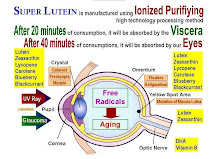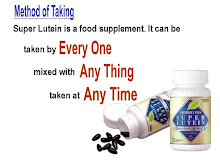 BETA-CAROTENE
BETA-CAROTENEAs a precursor to vitamin A (meaning your body uses it to make the vitamin), beta-carotene is primarily known for one great role: healthy vision. But this nutrient supports more than just your eyes. It also contributes to strong teeth, healthy skin and hair, and well-functioning immune and reproductive systems -- all without the toxicity risk often associated with the over-consumption of vitamin A alone.
Of course, your body can convert some of the 600 other carotenoids (plant pigments) into vitamin A. But beta-carotene is the best of the bunch; it's twice as effective as its cousin, alpha-carotene, at making vitamin A. Beta-carotene also works with other antioxidants like vitamins C and E to fight free radicals, reduce the risk of infection, and help protect against many types of cancer. And beta-carotene supports heart health, according to the results of the Physicians' Health Study, conducted by Brigham and Women's Hospital and Harvard Medical School on more than 15,000 male physicians. Those who ate at least two and a half servings of vegetables daily were far less likely to develop coronary heart disease than those who consumed less than one serving each day.
Recipes
Parmesan-Coated Sweet Potato Fries
Cantaloupe and Avocado Salad
Buying Tips
When shopping for foods rich in beta-carotene, let colors guide you. The best sources come in bright packages -- orange and yellow fruits and vegetables (such as apricots, cantaloupes, carrots, mangoes, pumpkins, squash, and sweet potatoes) as well as dark-green vegetables (such as broccoli, collard greens, and spinach). In general, the deeper the color, the more beta-carotene a food contains. Although overdose of beta-carotene is unlikely to be dangerous (your body will use only enough to produce the vitamin A it needs), you might wonder whether eating carrots with reckless abandon will make you turn orange. Not to worry. Although it's true that consuming high doses of beta-carotene in supplements or foods can turn the skin yellowish, the condition (known as carotenodermia) poses no health risks and disappears when you cut back on these foods for a few days.
In general, you don't have to make major changes to increase the amount of beta-carotene in your diet. "Getting more is often a matter of making substitutions," says Billie McGuire-Novak, R.D., a dietitian and nutritionist in Marathon, Florida. Choose sweet potatoes over white; make your salads with spinach (adding some walnuts to help your body better absorb this fat-soluable nutrient); snack on a slice of apricot; or drink carrot juice instead of orange. Or you can try the following beta-carotene-filled recipes.
Pass on the Supplements
You may be tempted to take beta-carotene in pill form, thinking it offers more-powerful protection than its dietary counterpart. But many studies have shown that supplements don't offer the same health protection as natural beta-carotene, especially in high-risk groups like smokers. In fact, supplements often contain such high amounts of beta-carotene that it competes with absorption of other carotenoids, which disrupts the balance of nutrients in the body.









Interesting Article. Hoping that you will continue posting an article having a useful information. Lutein Singapore
ReplyDelete